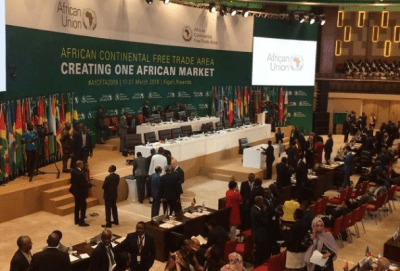The implementation of the African Continental Free Trade Area (AfCFTA) agreement will not begin on July 1st this year as planned due to disruptions caused by the novel coronavirus (COVID-19) global pandemic.
The Secretary-General of AfCFTA secretariat stated this in a conference call. “It is obviously not possible to commence trade as we had intended on 1st July under the current circumstances,” stated.
According to him, AfCFTA has been put on ice until the coronavirus has been defeated. He stated: “I think that’s the responsible thing to do. I don’t think it would be appropriate when people are dying to be focused on meeting the July 1st deadline. Instead, all governments should be allowed to concentrate their efforts on fighting the pandemic and saving lives at home.”
AfCFTA is a free trade area which as of 2018 includes 28 countries. The free trade area is the largest in the world in terms of the number of participating countries since the formation of the World Trade Organization (WTO). Once operational, the free trade area will cover a market of over 1.3 billion people, and is expected to generate a gross domestic product (GDP) to the tune of up to $2.5 trillion.
The agreement was brokered by African Union (AU) and was signed on by 44 of its 55 member states in Kigali, Rwanda on March 21, 2018. The agreement initially requires members to remove tariffs from 90 percent of goods, allowing free access to commodities, goods, and services across the continent.
Widely touted as an economic saviour, the AfCFTA was signed and ratified in record time and was due to come into effect – that is, free trading was supposed to start – on 1st July 2020. The AU summit which South Africa was to host on 30th May to encourage trade negotiators to complete their bargaining on tariff reductions, rules of origin and other necessary regulations, will now probably only happen earliest in November or December.
Copyright Ships & Ports Ltd. Permission to use quotations from this article is granted subject to appropriate credit given to www.shipsandports.com.ng as the source.
